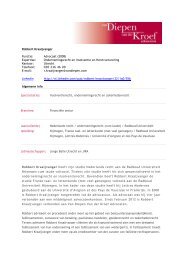© Van Diepen Van der Kroef Advocaten
© Van Diepen Van der Kroef Advocaten
© Van Diepen Van der Kroef Advocaten
- No tags were found...
Create successful ePaper yourself
Turn your PDF publications into a flip-book with our unique Google optimized e-Paper software.
90. The ICJ gave an Advisory Opinion in 1999 (ICJ 29 April 1999, Difference Relating to Immunityfrom Legal Process of a Special Rapporteur of the Commission on Human Rights, I.C.J.Reports 1999, p. 62 et seq., hereafter: ‘the Advisory Opinion’). This concerned the immunityof international organisations in general and the UN in particular. The State of theNetherlands also referred to the Advisory Opinion un<strong>der</strong> point 3.2.7 of its motion in interimproceedings at first instance. The State of the Netherlands asserted on the basis of thisAdvisory Opinion of the ICJ that where proceedings are brought against the UN, the countrywhere the proceedings are brought is obliged to inform the Court of the position of theSecretary-General of the UN regarding the question of its immunity. The Court would thenbe obliged to follow the view of the Secretary-General of the UN unless there werecompelling reasons not to acknowledge that immunity. Such a compelling reason would onlyexist, according to the State of the Netherlands, where the UN expressly waived itsimmunity.91. The Advisory Opinion of the ICJ in the matter referred to above first of all related to anessentially different fact-complex. It concerned a dispute against the Special Rapporteur forthe UN Commission for Human Rights regarding the independence of the courts andattorneys in Malaysia. It did not, therefore, involve proceedings brought against the UNitself and the gravity of the case was of an entirely different or<strong>der</strong> from genocide. After thisUN Rapporteur had expressed negative comments in a newspaper interview on the subjectof his enquiry he was beset with legal proceedings claiming compensation. This wasmanifestly an attempt to influence the judgment of the UN Rapporteur by putting him un<strong>der</strong>pressure with legal proceedings during the enquiry. Section 22 of the Convention providesthe possibility for the Secretary-General to give a finding on the question whether an officialof the UN has acted within the performance of his or her duties, in which case functionalimmunity would attach. The Secretary-General of the UN concluded that the UN Rapporteurremained within the scope of his task when expressing his opinions so that functionalimmunity attached.According to the ICJ Malaysia should have brought the issue of immunity to the attention ofthe court at the commencement of the legal proceedings.92. The power of the Secretary-General to give a finding relates to the question whether therewas an exercise of function during a mission and not to the question whether immunityought to be accorded (see number 60 of the Advisory Opinion). The scope of immunity isclearly set out un<strong>der</strong> number 61 of the Advisory Opinion:<strong>©</strong> <strong>Van</strong> <strong>Diepen</strong> <strong>Van</strong> <strong>der</strong> <strong>Kroef</strong> <strong>Advocaten</strong> page 40 of 99
















